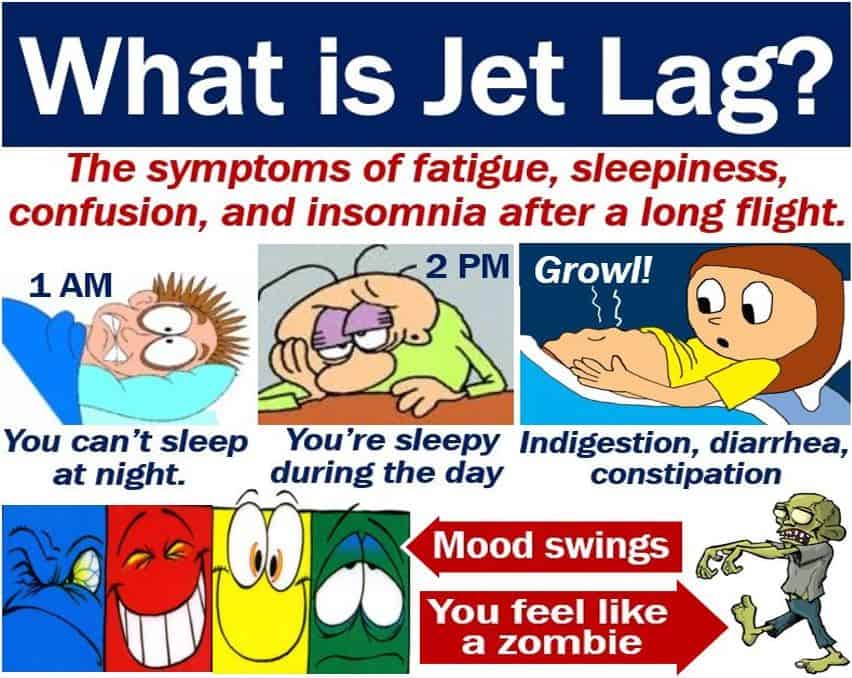Jet lag is a temporary disorder people experience after traveling by air across time zones. The person’s body clock has not yet adapted to the new time zone. The sufferer complains of insomnia, fatigue, irritability, lack of concentration, and other symptoms. We also call it flight fatigue, desynchronosis, or jet lag disorder. Medical practitioners use the term circadian dysrhythmia.
Medical professionals say that jet lag is a circadian rhythm sleep disorder. Circadian rhythm, in this context, refers to our internal body clock that makes us sleep at night and remain awake during the day. We call the night-and-day rhythm our light-related circadian rhythm.
Put simply; jet lag occurs when a long flight disturbs our normal sleep pattern. In most cases, the symptoms improve within a few days as we adjust to the new time zone.
The Mayo Clinic has the following definition of the disorder:
“Jet lag is a temporary sleep problem that can affect anyone who quickly travels across multiple time zones.”

Jet lag symptoms
The severity of symptoms can vary. You may experience one or more of the symptoms below:
– Sleep problems, such as waking up at the wrong time and insomnia. Even if you manage to sleep, it may not be good quality sleep. You may also suffer from excessive sleepiness.
– Fatigue during the day.
– You may find it hard to concentrate and function properly.
– Poor memory.
– Diarrhea, constipation, indigestion, and other stomach problems.
– Malaise, i.e., a general feeling of being unwell.
– Irritability and mood swings.
How to reduce jet lag
It is not possible to prevent jet lag. However, there are things we can to do to reduce its severity and effects.
Before flying, get plenty of rest. Some people find that gradually changing their sleep routine before flying helps.
For example, if your destination is in a time zone ahead of yours, start going to bed a bit earlier each day. Do this before you travel. You should also get up slightly earlier.
Do not eat large meals before and during your flight. Healthcare professionals advise against drinking alcoholic or caffeinated drinks.
Drink plenty of water during your flight. If it’s a normal sleep time at your destination, then sleep during your journey. If they help you sleep, use earplugs and an eye mask.
Try to keep active by walking around the cabin and stretching.
If its a short stay
If your stay is a short one, perhaps you should not try to change your circadian rhythm. In other words, stay on ‘home time.’ Otherwise, you will soon have another jet lag problem when you get back home.
Some people say that taking melatonin can help you get over the unpleasant symptoms more quickly. However, the UK’s National Health Service says:
“Melatonin supplements aren’t recommended for jet lag because there isn’t enough evidence that they work.”
The human body releases melatonin in the evening to let the brain know it is time to sleep.
Studies have shown that people on business trips have relatively poor productivity if they suffer badly from jet lag. Productivity refers to production per person over a given period.
Video – The Science of Jet Lag
This video by The Royal Institution explains what jet lag is. It also talks about what we can do to reduce its effect.
